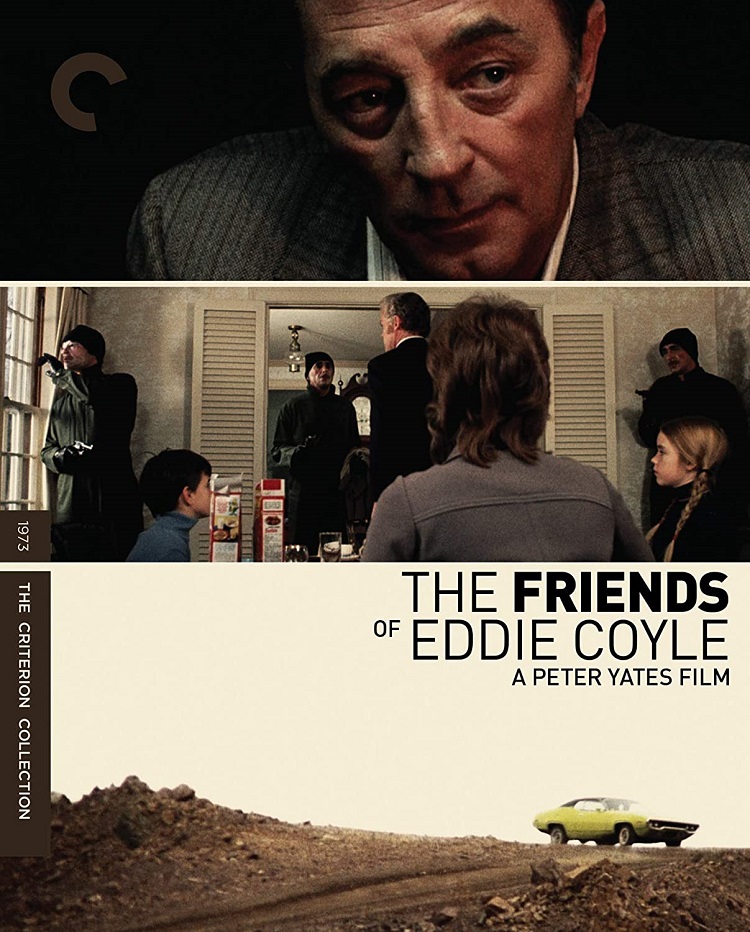
Released about a year after Coppola’s crime epic, The Godfather, The Friends of Eddie Coyle was seen by some critics as a kind of anti-Godfather when it was released. Both films are about the criminal world and how it suffuses the lives of those in it, but while The Godfather had a sepia-toned romanticism, Peter Yates’ film, an adaptation of a George V. Higgins novel, has no room for sentimentality, or glamor.
There’s not much in the way of violence in the movie, either. It’s a crime story, and it’s about criminals, and while there’s bank robberies, home invasions, gun running, and a mob-land hit, The Friends of Eddie Coyle is not full of blood, red in tooth and claw. It is by no means an action movie, but rather follows several criminals in various capacities, doing the nuts and bolts of their jobs.
Eddie Coyle (in an understated, powerfully desperate performance by Robert Mitchum) is a low-level Boston criminal about to be sentenced up in New Hampshire for a job that went bad, and he’s looking for any way he can get out of it. His main lifeline is Dave Foley, an ATF agent who uses Eddie as an informant and who hints (but does not say) he might have some pull with the DA if Coyle gives him the right information.
Throughout the film, Eddie moves through his various connections, aiding and abetting criminals (he works as a gunrunner) while seemingly indignant that he’s going to be going down for a crime himself, of which there’s no doubt he’s guilty. These “friends” of Eddie Coyle are his gun supplier, a gangster running a series of masked bank robberies, and a bartender (Peter Boyle, whose performance has a certain chilling, blasé sense of menace about it) who is also, unbeknownst to Eddie, informing on his own criminal buddies to ATF agent Dave Foley.
The director Peter Yates might be most famous for the car chase sequence in Bullitt (though my personal favorite of his films is Breaking Away) but he does not approach the scenes of criminality in The Friends of Eddie Coyle with any of that sense of breathless action. During one long bank robbery sequence, where we follow the robbers from the bank manager’s house to the bank to some spot on the highway where they eventually let the man go, walking blindfolded on the side of the street away from their car, the action is slow, and meticulously detailed. In the commentary available on this typically fine-looking Criterion Blu-ray release, Yates reveals that the bank they shot in was a real bank, the details of the robbery taken from consultants “on both sides.”
The entire sequence, with its studied lack of violence, demonstrates one of the major thrusts of the film: to criminals, their criminality is not striking back at a society that has done them wrong. It is not psychotic villainy with the intent of destroying the social order. It is a job. It’s where they’re professionally capable, and they expect the same thing from others, criminal and victim alike.
The Friends of Eddie Coyle, in theme and approach, plays as a precursor to HBO series The Wire, a procedural that looks, without histrionics, at criminals and law enforcement as clearly as possible. In Eddie Coyle, the Dave Foley ATF agent seems like the most diabolical character on the screen. He’s knowingly playing people who (forgetting their own relative positions in the social order) seem to depend on his integrity, and for him to look out for their own best interests. The “bad guys” come to the cop, expecting a square deal, like they’d give each other.
In an early scene when Coyle is going over some detail about a gun purchase with his supplier, he tells him why he’s called Eddie Fingers – because some deal he was a part of landed someone in jail, and there had to be repercussions. All the fingers on his hand were shattered by have a drawer kicked shut on them. And the man who did it said, “There’s nothing personal in it, you understand, but it just has to be done.”
And even with his sentencing looms closer, as he gets more and more desperate, there’s that sense of detachment to Eddie Coyle. His work ain’t personal, it’s just the job. This doesn’t make for rip-roaring crime action, but it does make an affecting, sober and revealing portrait of how some very bad men manage to live with themselves.